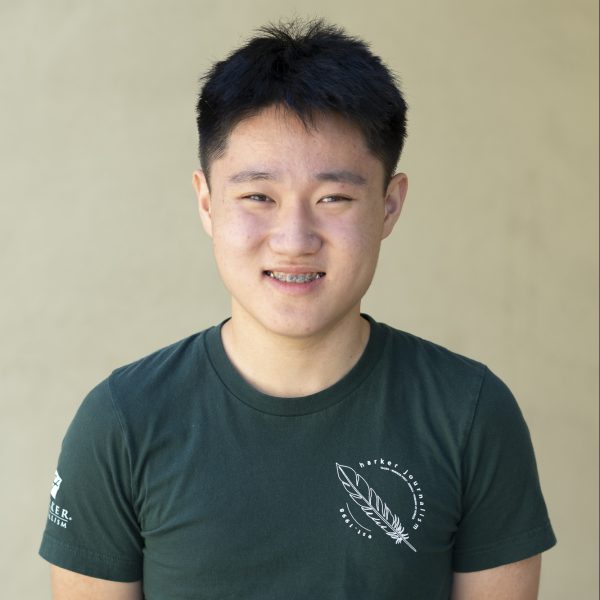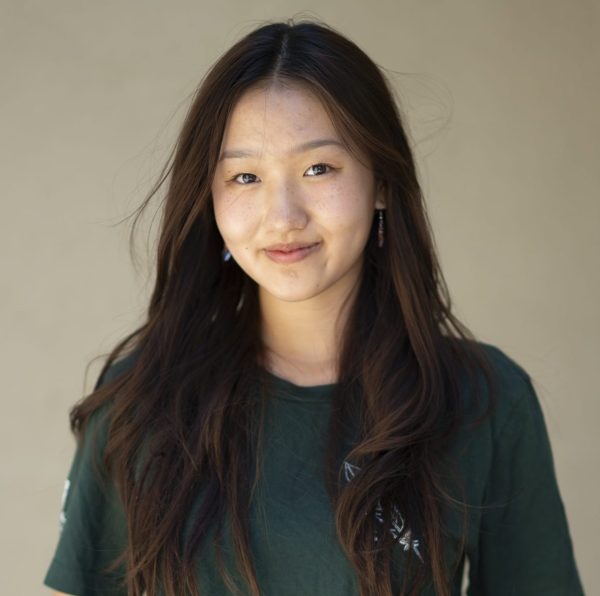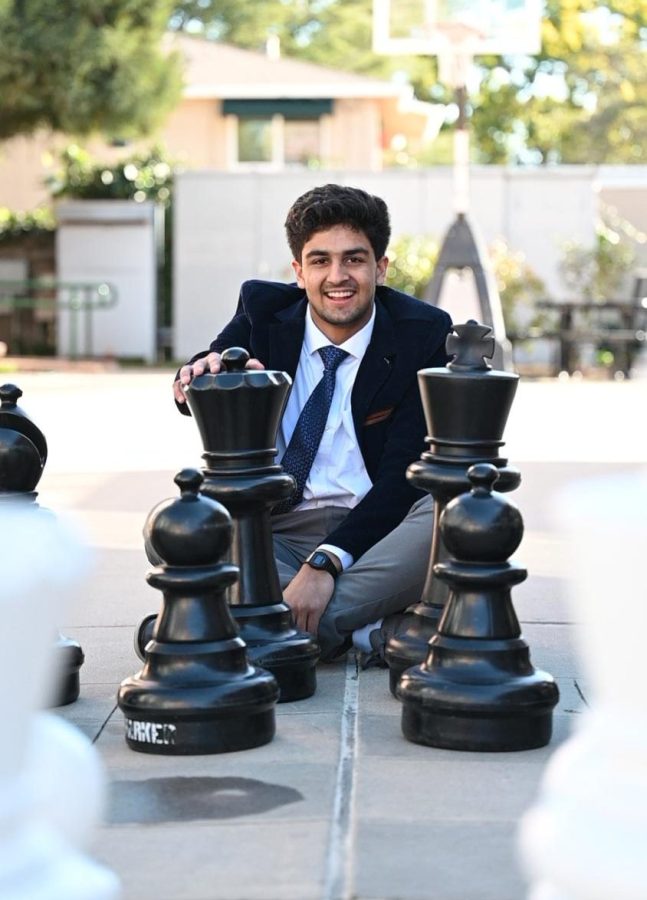Apex: Promoting to final rank
Vyom Vidyarthi (10) masters the mental game of chess
Vyom Vidyarthi (10) sits behind the king and queen chess pieces at the large chessboard behind Dobbins Hall. His current standard rating stands at 2426.
King to E6, and the game ends. The enemy’s lone rook, stranded on the last rank, can no longer defend against the threat of the pawn promoting to a queen, and Vyom Vidyarthi (10) claims victory as his opponent resigns. A chess player ever since kindergarten, Vyom is now at a standard rating of 2426, and he earned the title of International Master in August.
In the world of chess, the International Chess Federation, or Fédération Internationale des Échecs (FIDE), assigns ratings and awards titles to expert players. Players can gain rating by beating stronger opponents, but will lose rating when weaker opponents defeat them.
Although Vyom is already seventh in the United States for his age group, he is still looking to improve. With a rating requirement of 2400, the International Master (IM) title is the second highest title a chess player could receive before Grandmaster (GM), which requires a rating of 2500. Additionally, these two titles require two or three “norms,” which are tournaments against strong opponents where the player must perform at a certain level.
“I’m definitely striving to get [the] grandmaster [title],” Vyom said. “I have one norm, [and] you need three of those to get the title. So I’m trying to get the other two, but [to get] a norm there are a lot of requirements, like who you play against, where they’re from and how many points you score.”
Chess club officer Andy Chung (10), who has known Vyom since kindergarten, appreciates Vyom’s input at the club’s meetings and admires his achievements as the strongest chess player there.
“When people don’t understand why a move or a certain strategy or a certain series of moves is important, he will take the time to explain it to us to the point where we can understand it,” Andy said. “I really admire not only [his] amazing ability to play the game, but also to teach others. He’s a great teacher and I enjoy learning from him when I get the chance to.”
After earning the IM title last July, Vyom played in the 2022 Panamerican Youth Chess Championships in Uruguay, where he won 6 out of 9 games and drew the remaining 3, enabling him to win in his section. His younger sister, Omya Vidyarthi (7), who is a Woman Candidate Master (WCM) with a rating of 1986, played in a parallel section. Vyom reflects on his experience supporting his sister in the tournament.
“Honestly, for me, even winning that tournament didn’t really give me anything,” Vyom said. “The reward for the tournament was a title that I already had, but my sister was trying to get a title from that tournament, and I just wanted to accompany her. I was playing for fun, and not having the stress also [helped]. We both ended up winning that tournament, and I think that was the first time that any siblings won that tournament.“
With nine rounds of action, playing in this tournament was no easy task. Unlike rapid or blitz chess where players typically have around three to 15 minutes of thinking time, standard chess gives each player over an hour and awards extra time for each move played.
“When you get to big tournaments, games can last five hours or so,” Vyom said. “You can have more than one game per day, and the tournaments are really long. They’re nine rounds usually, so you’ve got to be able to keep your focus.”
In addition to playing in tournaments, Vyom and his coach are innovating the game by developing new openings, which are the memorized sequences of the very first moves in the game. Hoping to be able to surprise opponents by choosing unusual moves, Vyom analyzed a variation of the Van Geet opening with his coach.
“I didn’t play [that opening] much, and then about two years later, I decided to go back to it and studied it more in depth,” Vyom said. “After that, I started playing and I had really good results … Most people haven’t seen this opening before, so they have less preparation. You have a big advantage from that because you know the ideas and the position, but they don’t really know.”
Realizing the potential of this obscure opening, Vyom and his coach began working on a book, hoping that they might be able to get a few variations named after themselves. However, despite his work on his opening stages, the most rewarding part of chess for Vyom is the middle game.
“[It’s] less of memorization and more of what you can think about and what kind of ideas you can come up with,” Vyom said.
Despite his busy schedule, Vyom makes sure to set aside at least one hour every weekday and two to three hours on the weekend to practice chess, but even with all of his preparation, facing off against other players is always difficult. For Vyom, though, the challenges of the game always pay off.
“It’s kind of stressful while you’re playing, but it’s interesting,” Vyom said. “It’s similar to a test in that you’re thinking a lot, and during the game it might not feel that great. When you lose, then you’re like, ‘Why am I playing?’ But then [when] you win, it’s really rewarding.”

Grant Yang (11) is the co-academics editor for the TALON Yearbook, and this is his third year on staff. Grant is looking forward to designing his pages...

-Lindsey Tuckey (11) is the co-conservatory editor for the TALON Yearbook, and this is her third year on staff. This year, she hopes to explore people's...

Katelyn Zhao (12) is the co-editor-in-chief of Humans of Harker, and this is her fourth year on staff. Katelyn aims to honor each of the stories within...


















![“[Building nerf blasters] became this outlet of creativity for me that hasn't been matched by anything else. The process [of] making a build complete to your desire is such a painstakingly difficult process, but I've had to learn from [the skills needed from] soldering to proper painting. There's so many different options for everything, if you think about it, it exists. The best part is [that] if it doesn't exist, you can build it yourself," Ishaan Parate said.](https://harkeraquila.com/wp-content/uploads/2022/08/DSC_8149-900x604.jpg)




![“When I came into high school, I was ready to be a follower. But DECA was a game changer for me. It helped me overcome my fear of public speaking, and it's played such a major role in who I've become today. To be able to successfully lead a chapter of 150 students, an officer team and be one of the upperclassmen I once really admired is something I'm [really] proud of,” Anvitha Tummala ('21) said.](https://harkeraquila.com/wp-content/uploads/2021/07/Screen-Shot-2021-07-25-at-9.50.05-AM-900x594.png)







![“I think getting up in the morning and having a sense of purpose [is exciting]. I think without a certain amount of drive, life is kind of obsolete and mundane, and I think having that every single day is what makes each day unique and kind of makes life exciting,” Neymika Jain (12) said.](https://harkeraquila.com/wp-content/uploads/2017/06/Screen-Shot-2017-06-03-at-4.54.16-PM.png)








![“My slogan is ‘slow feet, don’t eat, and I’m hungry.’ You need to run fast to get where you are–you aren't going to get those championships if you aren't fast,” Angel Cervantes (12) said. “I want to do well in school on my tests and in track and win championships for my team. I live by that, [and] I can do that anywhere: in the classroom or on the field.”](https://harkeraquila.com/wp-content/uploads/2018/06/DSC5146-900x601.jpg)
![“[Volleyball has] taught me how to fall correctly, and another thing it taught is that you don’t have to be the best at something to be good at it. If you just hit the ball in a smart way, then it still scores points and you’re good at it. You could be a background player and still make a much bigger impact on the team than you would think,” Anya Gert (’20) said.](https://harkeraquila.com/wp-content/uploads/2020/06/AnnaGert_JinTuan_HoHPhotoEdited-600x900.jpeg)

![“I'm not nearly there yet, but [my confidence has] definitely been getting better since I was pretty shy and timid coming into Harker my freshman year. I know that there's a lot of people that are really confident in what they do, and I really admire them. Everyone's so driven and that has really pushed me to kind of try to find my own place in high school and be more confident,” Alyssa Huang (’20) said.](https://harkeraquila.com/wp-content/uploads/2020/06/AlyssaHuang_EmilyChen_HoHPhoto-900x749.jpeg)




